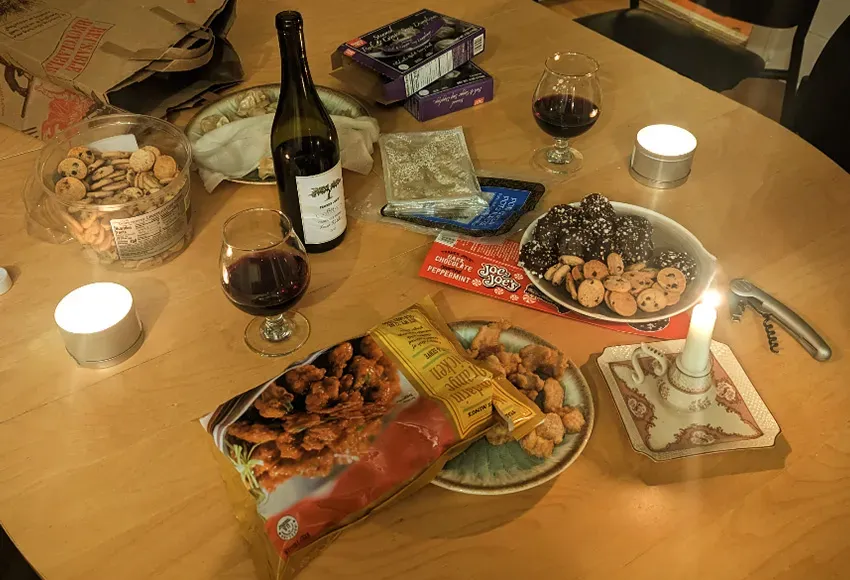For this issue, I was looking to report on alternative Thanksgiving gatherings created by young Queer people who couldn't spend it with their families for whatever reason. Maybe they were rejected for their identity, maybe the rising cost of living made affording a plane ticket home impossible, or maybe Thanksgiving's ties to colonization raised ethical concerns that caused them to forgo the holiday. Whatever the reason, I wanted to find these get-togethers and report on all the different ways the feast day could look.
As soon as I started reaching out to groups, however, I found people concerned for their safety as a result of publicly speaking about their celebration, people who knew their social circle was doing something for the holiday but not exactly what, and people who weren't willing to share due to the private and intimate nature of their event. Put simply, the alternative Thanksgiving gathering was so incredibly personal, it apparently wasn't for a reporter to pry into.
My Friendsgivings have never been well planned and are usually thrown together at the last minute – so it might have been silly of me to assume that anyone else would feel comfortable having their own appear in a newspaper.
I would never let a reporter take photos of the Trader Joe's microwavable feast on my table. I'd never let them interview me about how my roommate and I rummaged through the near-empty supermarket shelves, taking whatever better-planned gatherings had rejected. My Friendsgiving preparations had me feeling like a rat, scurrying around and picking up scraps that would never fit into the traditional holiday aesthetic.
That rowdy, ratty, rugged event was by far the most enjoyable, though. There was no pressure to make every bit of the day go by a schedule or look like anything perfect, poised, polished, and picturesque. Anything could fit into our Queer celebration – including our preferred pronouns, the binder I wore for the first half of the night, and our shared hope for an inclusive future. We wore sweats, laughed about opening our third box of ginger soup dumplings, and poured each other cheap (by no means delicious) drinks. It was radical having that amount of appreciation and support in one room.
I'm disappointed that I encountered so many barriers to people sharing about what their Queer gathering looks like. It's so painful to know that these need to be kept meticulously private to protect the safety of their attendees. It's even more gut-wrenching to know that an image of perceived perfection that you always see in Hallmark films – a white family in pretty clothes around a table with a festive tablecloth and immaculately prepared food – has stopped me and others from feeling comfortable sharing about our "imperfect" get-togethers.
Despite my sadness about all the reasons a Queer person might not be able to talk to a reporter about the way they celebrate, I think the private nature of the event is part of what makes these alternative gatherings special. If they're forced to be private, the group truly gets to pick and choose what their holiday looks like. They get to exclude the uncle who has been waiting all year to utter a slur, avoid that one disgusting dish everyone eats as a courtesy, and spend a fraction of the money it would take to have a "perfect" celebration. It's an opportunity to completely reject what's rejected them, and create a deliciously Queer environment of mutual aid.
The reasons why these Friendsgivings can't be shared are despairing, but the event itself doesn't have to be. I encourage readers to keep their secrets and wholeheartedly enjoy their rattily organized celebration. Maliciously comply with the private corner the gathering's been forced into – the unenjoyable, "perfect" one wouldn't get it anyway.


